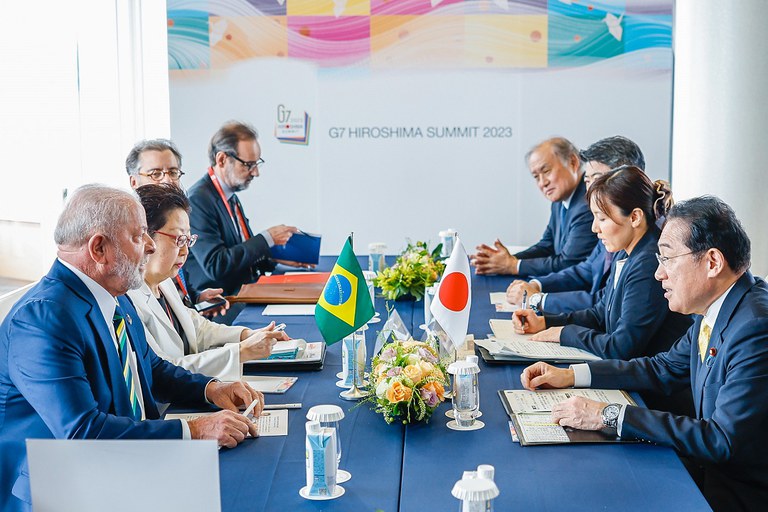Notícias
BRAZIL AND JAPAN
Lula highlights trade and investment in meeting with the Prime Minister of Japan

Fumio Kishida: "We’re extremely willing to cooperate with Brazil" - Credit: Ricardo Stuckert (PR)
President Luiz Inácio Lula da Silva met today with Prime Minister of Japan Fumio Kishida. The meeting took place in Hiroshima within the G7 summit framework. The two leaders discussed the expansion of bilateral flows of trade and investment; the agenda of peace and security; and the response to climate change.
Lula highlighted the significance of the relationship between Brazil and Japan. "Brazil and Japan must establish an even more productive relationship, not only from a commercial point of view, but also from a cultural, political and science and technology standpoint," he said.
Fumio Kishida emphasized Brazil’s important role in discussions concerning complex global issues. “We count on President Lula’s experience. We’ll hold even broader discussions on issues such as climate, education, development, peace and stability. We’re extremely willing to cooperate with Brazil," stated the prime minister.
Brazil is interested in establishing partnerships with Japan in science, technology and innovation. Some of these are in the fields of space, artificial intelligence, renewable energy, advanced materials and ocean research.
In the field of renewable energies, there is great potential regarding bioethanol, sustainable aviation fuel (SAF) and low-carbon hydrogen, among others, as well as reducing the steel industry’s emissions.
Also concerning the relationship between the two countries, President Lula highlighted Japan’s influence on Brazilian development. “Countless Japanese people have contributed to Brazil’s growth since 1908 - and Brazilian businesspersons are now investing in Japan," he said.
Prime Minister Kishida announced that the Government of Japan would initiate procedures towards the introduction of exemption of short-term stay visa for ordinary passport holders of Brazil.
BRAZIL-JAPAN RELATIONSHIP — Japan is a traditional partner of Brazil in Asia and maintains with it strong bilateral ties in terms of trade, investment, and technical cooperation - as well as historic human ties.
These human bonds are an important aspect of Brazil's relations with Japan. Brazil is home to the largest community of Japanese descendants outside of Japan: more than 2 million people. Japan, in turn, harbors the fifth largest Brazilian community outside Brazil: around 204,000 Brazilians, and most of them are not of Asian descent.
Japan also played an important role in Brazilian industrialization, especially in the 1960s and 1970s. At that time, significant investments were made in mining, steel, shipbuilding, the automotive sector, electronics, pulp and paper. Presently, Brazil harbors around 700 Japanese companies.
BILATERAL TRADE — Japan was Brazil's 10th largest trading partner in 2022, at USD 11.9 billion in bilateral trade. Brazilian exports to Japan include corn, iron ore, chicken, coffee, aluminum, and soybeans. Brazil imports from Japan auto parts, chemical compounds, machinery and equipment.
There is a great deal of parity in the trade balance between Japan and Brazil. Japanese imports reached USD 5.3 billion in 2002, while Brazilian exports rose to USD 6.6 billion. Japan has also been one of the main sources of foreign direct investment (FDI) in Brazil: a stock of USD 22.8 billion (2021).
TECHNICAL COOPERATION — Brazil and Japan have been developing an important technical cooperation agenda since 1959. This relationship takes place through the Brazilian Cooperation Agency (Agência Brasileira de Cooperação/ABC), in connection with Itamaraty, and through the Japan International Cooperation Agency (JICA).
One of the first results of this cooperation was the Japanese-Brazilian Cooperation Program for the Development of the Cerrado (Programa de Cooperação Nipo-Brasileira para o Desenvolvimento do Cerrado/PRODECER), created in 1979 in collaboration with Embrapa, and materializing this biome’s great potential for agricultural exportation.
One example of the bilateral scientific cooperation between the two countries was the development of the Japanese-Brazilian digital TV system, later implemented in almost all of South America and in countries in Central America, Africa and Asia.
As of 2000, Brazil and Japan have developed a technical cooperation program on behalf of several developing countries, covering areas such as digital TV, agriculture and community policing.